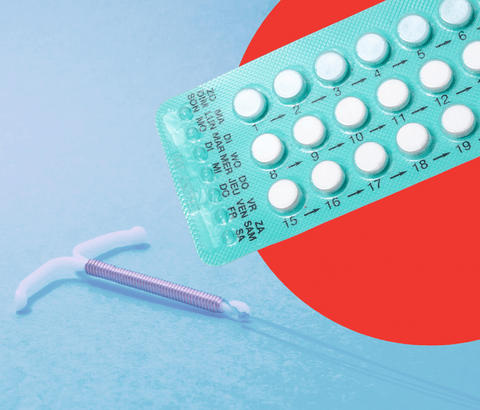Using journal prompts to understand and organize your thoughts is a simple and effective way to take care of yourself when life is hard or you feel overwhelmed, stressed, or burned out. Journaling consistently is one of the most accessible and valuable ways to take a peek inside your own perceptions, feelings, and beliefs about life.
“Journaling is primarily a body/mind/spirit activity where the journal keeper makes sense of living.” [1]
Journaling is often a critical step to developing insights and pursuing personal goals, and can be used to better understand our mental and physical health [2].
This article explains what’s happening hormonally during each phase of the menstrual cycle, why those hormones may impact mental health, and how to use journal prompts to manage your cyclical emotions in a healthy way.
Why sync your journal prompts to your menstrual cycle phases?
For many people, mental health and the hormonal cycle of menstruation are connected.
The mind and body depend on one another to make it through each day, and because women are at a higher risk than men to develop mood disorders and depression [3], it’s important to be aware of hormonal happenings that may affect your thoughts and feelings.
Due to the ever-cycling emotions we experience throughout each phase of the menstrual cycle, slowing down to journal gives us a sense of ownership over our experiences, which can lead to more consistent self-compassion [2]. And we can all use more of that!
A gentle way to start journaling for mental and menstrual health is by tracking your cycle, and using unique prompts for each phase. Let’s explore some helpful examples based on women’s most commonly reported symptoms, emotions, and needs.
Menstrual phase journal prompts
HORMONAL HAPPENINGS:
The first day of steady bleeding marks Day 1 of the menstrual cycle. The hormones estrogen and progesterone are at their lowest point during this phase, and the neurotransmitter serotonin (a mood stabilizer) typically drops in tandem with cycling hormones [4].
It’s common to not feel your best during menstruation, or even close to it. Moods may reach their lowest lows, or be more vulnerable to dramatic swings. Because your emotional needs are unique during this phase, it’s important to take a step back and care of yourself just as you are—not as you may be in other phases!
Let’s get reflective and follow that natural intuition, reaching within ourselves for answers as we are more withdrawn and our energy is at its lowest.
JOURNALING PROMPTS:
Explore your values. Because energy is a limiting resource during the menstrual phase, clarifying what’s most important to you can help you focus your energy on the things that matter, so you don’t drain it on things that don’t.
- What are my values and priorities in my day to day life?
- Over the last month, have I lived within my values?
- Are there things in my life that aren't serving me? How can I limit or remove these things to give me more time to things that align with my values and priorities?
Follicular phase journal prompts
HORMONAL HAPPENINGS:
Following your period, the follicles (i.e. developing egg cells) in your ovaries start to mature. The pituitary gland in the brain begins producing hormones that tell the ovaries to start preparing for ovulation, or the release of one of those egg cells.
Estrogen levels steadily climb leading up to ovulation, and its rise comes with an energy boost. Our brains may feel sharper, we may take more risks, and feel more extroverted and confident [5].
JOURNALING PROMPTS:
Time to get organized. You can harness the hopeful, experimental, and clear-headed feelings of your follicular phase by starting new projects or setting new goals or intentions.
- Brainstorm a list of experiences you want to have within the next week, month, and six months. Then plan to make them happen! Connect with your people to get social time on your calendar.
- Reflect on your professional life. Create a plan for this week to connect with a leader, mentor, or colleague whose attributes you look up to and want to emulate.
- Create an “adventure ladder.” What are some fun, safe, and consensual activities that feel risky, but you’ve always wanted to try? Start with the “safest” steps that feel most feasible, then work your way up the ladder by adding steps further out of your comfort zone.

Ovulatory phase journal prompts
HORMONAL HAPPENINGS:
All the hard work that went into developing a viable egg cell pays off when estrogen peaks just before ovulation—and with it, your mood!
Studies show that estrogen helps boost serotonin production, and helps the body respond better to it [3]. The synergy between estrogen and serotonin can put your confidence, positive emotions, and sex drive at an all-cycle high.
JOURNALING PROMPTS:
Because the ovulatory phase may have us feeling like our boldest, bravest, most confident selves, your communication skills are especially sharp during this time [3]. Let’s make the most of them by verbalizing our thoughts and feelings.
- Write a letter to someone who’s been on your mind. It can be a letter of connection, love, anger, sadness, grief, betrayal, support, conflict, or something else. You don’t have to send it (though because you may be feeling particularly bold, you might!). Just the practice of articulating your exact thoughts while you’re especially coherent and clear-headed can be empowering.
- Create a plan to move your body and take time to reflect on how it makes you feel emotionally and physically. What kind of movement feels best to you? Walking, yoga, dancing in the living room, something else? Be open and curious around what feels good and what doesn’t—and brainstorm something that could feel better.
Luteal phase journal prompts
HORMONAL HAPPENINGS:
Once the egg bursts from the ovary, the follicle it grew up in transforms into a structure called the corpus luteum [6]. This corpus luteum starts releasing progesterone in preparation for a potential pregnancy.
Progesterone thickens the uterine lining so an egg will have a place to embed should it be fertilized. The lining grows thicker and thicker as progesterone levels (along with smaller amounts of estrogen) continue to climb [6]. If no egg was fertilized, however, progesterone and estrogen production shuts down and levels plummet, causing the lining of the uterus to fall away and leave as your period.
When hormone levels drop, the brain and body takes notice. Receptors that would otherwise interact with those hormones are sensitive to their absence, and PMS symptoms like moodiness, bloating, and fatigue set in.
JOURNALING PROMPTS:
Because feelings of anxiety or uneasiness are common during the luteal phase, it’s important to be intentional about showing yourself extra kindness. Time to explore self-affirmations, and remember what we love about ourselves.
Self-affirmations may sound like:
- I am good because:
- I am beautiful because:
- I am intelligent because:
- I love this about myself:
- I feel most positive when:
- I can show myself more self-compassion by:
- I am grateful for myself because:
You can also define a self-affirming mantra, or a “palm mantra”. Here’s how:
- Brainstorm and collect phrases, words, and quotes that are soothing to you.
- Choose five words or a five word sentence as your mantra for this phase. For example, “I am doing my best”, “I am worthy of rest”, or “It’s ok to take breaks”.
- Trace your hand, and on the top of each finger write one word of this mantra.
- Meditate and secure this mantra in your mind. Take it with you by using your palm and fingertips as a reminder when you’re away from your journal.

Alisha Miller, MS, LCMHC, NCC, is a Licensed Clinical Mental Health Counselor in North Carolina. She believes that all humans deserve access to thoughtful, evidence-based ethical care that caters to each persons’ specific needs and goals. Alisha finds joy in working with her clients through relational and personal boundaries, self-compassion, and trauma-informed bodywork. Alisha has worked in the university setting, private practice settings, and non-profit agencies utilizing an integrative, client centered approach. She diligently works with clients in areas that encompass her clinical certifications in Internal Family Systems Theory, Acceptance and Commitment Therapies, and Cognitive Behavioral Therapies.
This information is for educational purposes only. It is not a substitute for professional medical advice, and is not intended to diagnose, treat, cure, or prevent any condition.
References
1. Murray S. The benefits of journaling: “stories are medicine” “art is medicine.” Parks Recreation. 1997;32:68- 75
2. Haertl, Kristine. Journaling as an assessment tool in mental health. Assessments in Occupational Therapy. An Integrative Approach. Slack Incorporated. 2008.
3. Wharton, W., Gleason, C. E., Olson, S. R., Carlsson, C. M., & Asthana, S. (2012). Neurobiological Underpinnings of the Estrogen - Mood Relationship. Current psychiatry reviews, 8(3), 247–256.
4. Rapkin, A. J. (1992). The role of serotonin in premenstrual syndrome. Clinical Obstetrics and Gynecology, 35(3), 629-636.
5. Reed, B. G., & Carr, B. R. (2015). The normal menstrual cycle and the control of ovulation.
6. “Menstrual Cycle.” Menstrual Cycle - Better Health Channel.







